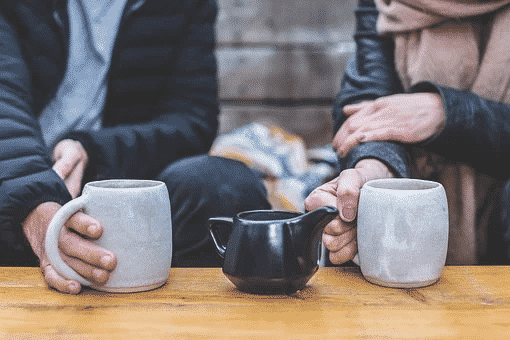Coffee vs Tea? Comparison, Health Benefits, and Taste Differences
Coffee Queries is reader-supported. When you buy through links on our website, we may earn an affiliate commission. Learn More
The coffee vs. tea debate is a dangerous thing to talk about because both sides aren’t willing to take it easy. Both the beverages have their devotees, and you need to be prepared for a heated argument when you broach this subject. Why is the debate such a big thing you ask? Well, because both the beverages are excellent sources of caffeine, and are a part of the lives of people around the world. Still, we’re settling the score once and for all. Here are all the differences between tea and coffee.
Coffee vs. Tea
The Plants
Coffee
Coffee comes from the Coffea plant, which is a small tree, or evergreen bush that is grown between the tropics of Cancer and Capricorn. These trees grow up to 10 meters tall, though most are trimmed to about 5m to keep them more manageable. The genus of the tree is Coffea, which belongs to the family Rubiaceae. These plants are native to Africa and Asia, however, they have since been planted in regions all over the world. The source plants are the biggest difference in coffee vs. tea.

Tea
Tea on the other hand comes from the Camellia Sinensis plant. These trees or shrubs belong to the Theaceae family, which is a family of flowering plants. There are two major varieties of tea plants. These are the C. Sinensis var. Sinensis and C. s. var. assamica. The multiple types of teas are all obtained from these two types, through various levels of maturation, oxidation, and roasting.
The Source
Coffee
Coffee is made from coffee beans, which are essentially seeds of the coffee plant. After the coffee plant matures, it produces coffee cherries, which are allowed to ripen. These cherries are all then picked by hand. When these berries are opened, the seed inside is extracted. This is what we call the coffee bean, and this is cleaned, and then sold in the market either roasted or unroasted.
Tea
Tea is made from the leaves and buds of the tea plant. These leaves and buds are dried and allowed to oxidize and are finally sold in the market in the dried stage. The different types of tea are picked at separate intervals and are allowed to oxidize to give different flavors. The part of the respective plants that are used to make the coffee is a significant one from all the coffee and tea differences.

Caffeine Content
Coffee
Coffee is a very popular source of caffeine throughout the world. The caffeine content can be slightly altered because of the brewing method, however, hot coffee should have an estimated 40 mg of caffeine per 100g of coffee. A healthy adult can consume about 400 mg of caffeine in a day according to the Food and Drug Association, FDA. So the caffeine in coffee is perfectly safe to consume.
Tea
Tea, on the other hand, sees a decrease in caffeine content by more than 50%. 100g of tea contains about 11 mg of caffeine only. So if you’re someone that needs more caffeine, coffee is the drink you should choose.
The Brewing Temperature
Coffee
Coffee can be either hot-brewed, or cold brewed. Hot brewed coffee is made between 195 degrees Fahrenheit and 205 degrees Fahrenheit. Cold-brewed coffee is made at around 68 degrees Fahrenheit.

Tea
Tea is brewed at a lower temperature which is why the caffeine isn’t completely extracted from the leaves, and tea has less caffeine. This temperature is between 140 degrees Fahrenheit to 200 Fahrenheit for special green teas.
The Taste
Coffee
Coffee is bitterer and more acidic than caffeine. This is because the hot water strips the acidic elements and caffeine into the brew. These acidic elements are then turned bitter by the whole water. This is why cold coffee is less acidic and less bitter than hot coffee. However, even cold coffee is more acidic than tea is. The taste of coffee is also the same no matter how it is brewed, and you have to choose additives to make it vary.
Tea
Tea, in contrast, comes in a wide variety of natural flavors. Although all the tea comes from the two varieties of the camellia Sinensis plant, the differences in oxidation make for a wide range of flavors. Different types of tea can have flavors ranging from earthy tones, to even citrusy tastes. Herbal teas have an entirely different palate, however, they cannot be considered real tea. This is because these do not come from the camellia Sinensis plant.

The Health Benefits
Coffee
Contains Helpful Antioxidants and Anti-inflammatory
Antioxidants in coffee help clean up free radicals from the body. These free radicals can cause cell damage, and in worse cases, cancer. Not just antioxidants, but coffee has a lot of anti-inflammatories too. These prevent a plethora of diseases.
Reduces Chances of Type II Diabetes
According to Healthline.com, coffee can help reduce the risk of diabetes by about 6%. This is said to be because caffeine preserves the activity of beta cells in the pancreas. These cells are what produce the hormone insulin in the body, which is important for removing excess sugar from the blood, by signaling the liver to start storing it. Without insulin, the body is unable to remove the excess sugar from the blood, and this condition is called Type II diabetes. Coffee also reduces insulin resistance in the body and thus makes it more effective. Not just this, but the plethora of antioxidants and anti-inflammatories in coffee also help prevent the development of diabetes.
Increases Attention and Work Capability
This is because of the high amounts of caffeine in coffee. Coffee inhibits the working of the hormone adenosine, which accumulates in the brain to make you sleepy. Not just this, but coffee also makes the body produce adrenaline, which makes you more energetic, and alert. Tea does this too, though the effect isn’t as strong, since tea has less caffeine.

Helps Prevent Liver Damage
Four cups of coffee a day can help prevent liver damage by 71% according to healthline.com. You might be wondering, is coffee good for your health? Well, the drink prevents diseases like liver cirrhosis, liver scarring, liver cancer, and hepatitis. So we would say yes.
Tea
Tea Has Less Caffeine
Since tea has less caffeine than coffee, it prevents possible caffeine addiction. This way you don’t over-consume tea like you would consume coffee. It also protects you from withdrawal symptoms.
Tea Helps Protect Your Heart
People that regularly consume tea have lower chances of suffering from a heart attack. Not just that, but drinking tea regularly has also been linked with preventing heart diseases.
Tea Helps You Manage Your Weight
The caffeine in tea helps burn calories which results in weight loss. Decaffeinated tea does not produce the same result. Moreover, even tea with a lot of caffeine causes very little weight loss. Still, this may be one of the health benefits of tea that have the most demand.

Tea Can Help You Fight Cancer
Drinking tea is good for your health, as it can reduce the chances of multiple cancers, one of which is prostate cancer. The antioxidants in tea help prevent cancerous cells from forming and growing in the body.
Helps Lower Cholesterol in the Body
Catechins in tea are responsible for its ability to reduce cholesterol in the body.
Helps Protect Teeth
Drinking tea changes your mouth’s ph to a number that inhibits bacterial growth in the mouth, and increases dental health.
| Coffee | Tea | |
| Nutritional Content | Calories- 0 Sodium- 2 mg Potassium- 49 mg Caffeine- 40 mg Protein- 0.1 g | Calories- 1 Sodium- 4 mg Potassium- 18mg Carbohydrate- 0.2 g Protein- 0.1 g Caffeine- 11 mg |
| Types | Types of Beans: Arabica Robusta Types of Drink: Cappuccino Latte Cold coffee Espresso etc | Black tea White tea Oolong tea Green tea Pu’erh tea |
| Place of Origin | Ethiopia | China |
| Time of Origin | Middle of 15th century | 2737 BC |
| Biggest Producer | Brazil | China |
| Market Share | $102.02 billion in 2020 | $55,144 million in 2019 |
| Amount Consumed Annually | 10.4 million tons | 6.9 million tons |
| Brewing Temperature | 195-205 degrees Fahrenheit | 140-200 degrees Fahrenheit |
| Benefits | Prevents DNA damage Increased alertness Contains antioxidants and anti-inflammatory Reduces chances of diabetes Prevents diseases like Alzheimer’s and Parkinson’s | Can help fight cancer Helps fight liver damage Helps improve heart health Can help lose weight Prevents caffeine addiction |
| Drawbacks | Caffeine addiction Acid influx and heartburn Insomnia Coffee can cause dehydration Can cause anxiety Dullness of skin Fatigue Withdrawal symptoms | Tea causes a reduction in iron absorptions because of tanning Can lead to Headaches May cause Dizziness Increases stress, restlessness, and anxiety Can cause gastric ulcers |
Sources: WorldAtlas.com, Healthline.com, Mordor Intelligence
Conclusion
The Coffee vs. tea debate may be extensive, but we’ve done our best to sum it all up for you. Both brews have their advantages and disadvantages, as well as very complex histories, and we believe only the consumers can be the judges. After all, what the choice ultimately comes down to is your taste. Whether you like coffee or tea, depends on whether you like your drink acidic and bitter, or milder. It also depends on how much caffeine you want to consume, and what flavors you prefer. Whichever brew you like, we recommend you take it in moderation. Excessive consumption is never a good thing.






